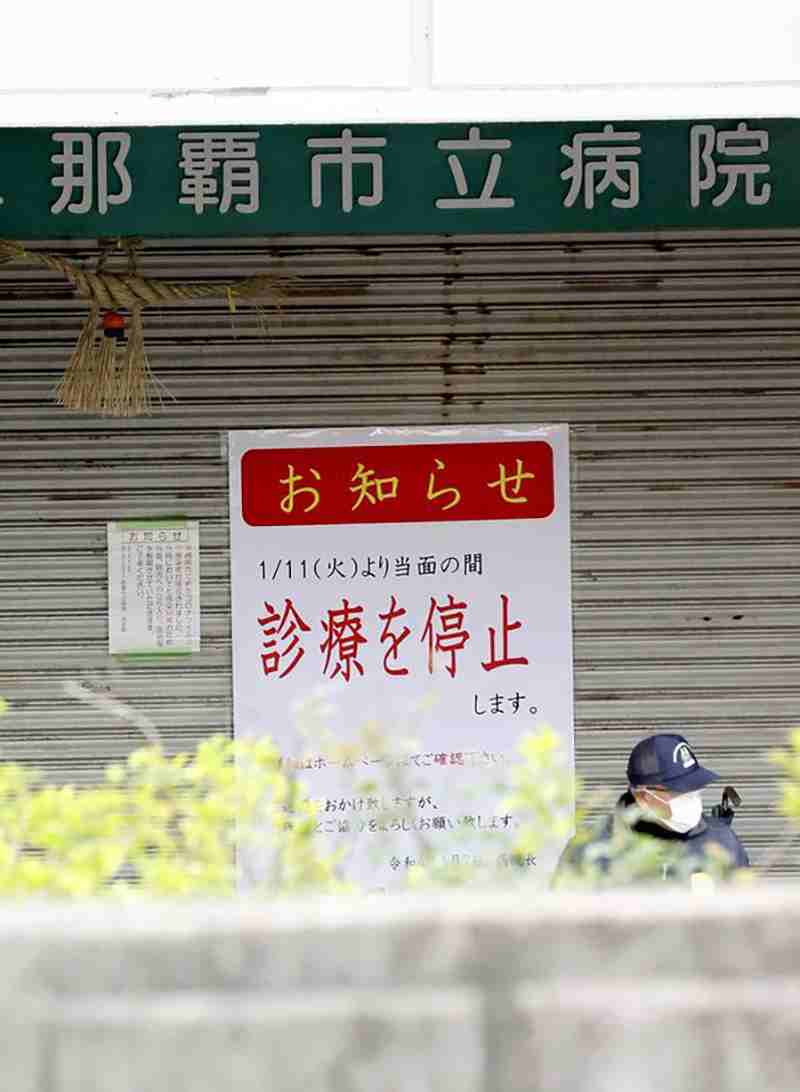
The Yomiuri Shimbun A notice posted at Naha City Hospital on Thursday says the hospital was suspending treatment of general outpatients.
17:19 JST, January 14, 2022
The sudden spread of the omicron variant of the novel coronavirus has stalled operations of medical institutions, schools and welfare facilities in Okinawa Prefecture.
This is because workers who are confirmed to have been in close contact with COVID-19 patients are taking days off for self-quarantine, causing a manpower shortage. The Okinawa prefectural government and experts are calling for a shorter quarantine period in order to maintain the activities of society.
Work absence
“Medical staff became close contacts one after another, and we don’t know when we can restart our business,” a senior staff member of the Naha City Hospital said. The hospital has not accepted general outpatients since Tuesday after more than 50 of its doctors and nurses were confirmed to have been in close contact with infected people.
No hospital-acquired infection has been confirmed, but many of the staff were close contacts of family members whose workplaces or nursery schools had virus outbreaks.
The labor shortage is spreading beyond hospitals.
When teachers at a prefectural school were infected, other teachers were classified as close contacts and had to stay away from work. As the result, the school had to temporarily close.
In the elderly nursing care field, Social Action Ltd., based in Urasoe City and entrusted by the prefecture to dispatch nursing care workers, has yet to fulfill requests from seven facilities because it has become short on available staff.
Meanwhile, dozens of Okinawa prefectural police officers have been infected, and the police are busy filling vacancies.
Gov. Denny Tamaki told reporters Thursday that work restrictions for close contact people would stall business operations, seriously affecting the activities of society.
“It would be nice if it were for 10 days,” he said of the 14-day quarantine period.
Special measure
A “close contact” is defined as someone who has been within about 1 meter of an infected person for 15 minutes or more without masks or other necessary precautions. This includes family members living together, passengers on airplanes, and those riding together in cars for a long time.
Under the Infectious Diseases Control Law, they must quarantine at home or in a care facility for 14 days from the day they were last in contact with an infected person.
According to the Naha city health center, each infected patient is found to have been in close contact with four or five people on average. Although their overwhelming tasks have kept health centers from tabulating the precise number of close contact people in the prefecture, they estimate that more than 10,000 people have been infected so far this month, with between 40,000 and 50,000 others having been in close contact with the patients.
In August last year, the Health, Labor and Welfare Ministry introduced a preferential measure to allow medical workers to come to work even during their quarantine period, as long as they have been vaccinated, are asymptomatic and test negative before starting work.
However, this exemption was designed with the spread of the delta variant in mind. It has not been implemented yet because it was not clear whether it is appropriate for the omicron situation.
But the ministry announced on Wednesday its intention for the preferential measure to be valid for omicron, too. In response, the Naha City Hospital plans to shorten the quarantine period for medical workers from the current 14 days to seven days under its in-house rules. The ministry is considering expanding the scope of the measure to non-medical workers.
Incubation period
The shortening of the quarantine period is based on a scientific finding that the omicron variant has a relatively short incubation period.
The National Institute of Infectious Diseases checked the incubation period of the omicron variant detected in 17 COVID-19 patients in Okinawa Prefecture who became infected in December last year or January this year, and found that the median incubation period was three days, which is shorter than delta’s four to five days.
“I got an impression that the omicron variant has a short incubation period and its numbers decrease quickly,” said University of the Ryukyus Prof. Jiro Fujita, who heads the prefecture’s expert panel on COVID-19 measures. “A major impact on social life is expected to spread nationwide soon. We need to review the current quarantine period for close contacts.”
Top Articles in Society
-

Man Infected with Measles Reportedly Dined at Restaurant in Tokyo Station
-

Man Infected with Measles May Have Come in Contact with Many People in Tokyo, Went to Store, Restaurant Around When Symptoms Emerged
-

Woman with Measles Visited Hospital in Tokyo Multiple Times Before Being Diagnosed with Disease
-

Australian Woman Dies After Mishap on Ski Lift in Nagano Prefecture
-

Foreign Snowboarder in Serious Condition After Hanging in Midair from Chairlift in Nagano Prefecture
JN ACCESS RANKING
-

Japan PM Takaichi’s Cabinet Resigns en Masse
-

Japan Institute to Use Domestic Commercial Optical Lattice Clock to Set Japan Standard Time
-

Israeli Ambassador to Japan Speaks about Japan’s Role in the Reconstruction of Gaza
-

Man Infected with Measles Reportedly Dined at Restaurant in Tokyo Station
-

Videos Plagiarized, Reposted with False Subtitles Claiming ‘Ryukyu Belongs to China’; Anti-China False Information Also Posted in Japan





















